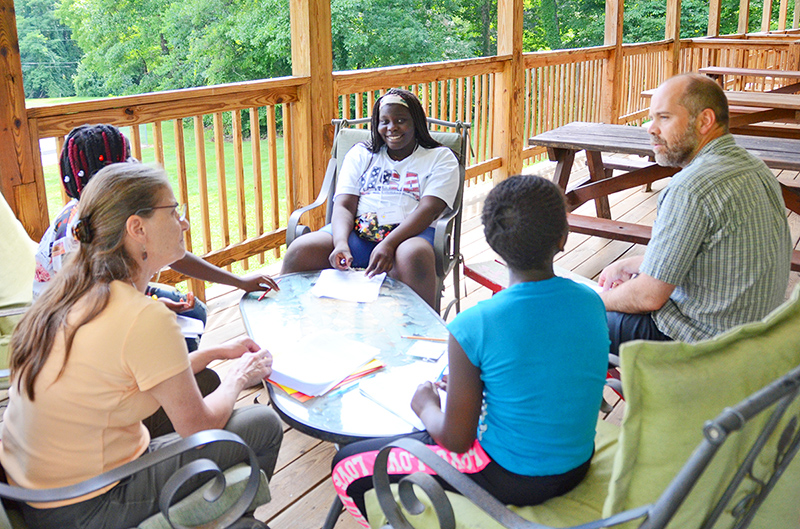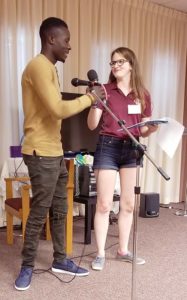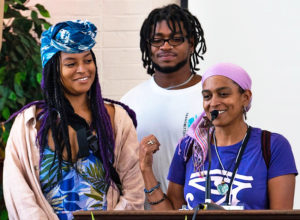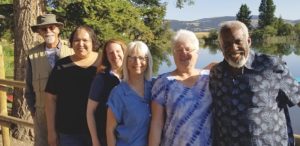



After more than a year’s consultation, reflection and testing, a fledgling program on “Walking Together on a Path Toward Race Amity” was introduced in May through September at three Baha’i retreat centers and more than 20 weekend seasonal schools nationwide.
Put together by a multiethnic task force of the National Spiritual Assembly, the national Baha’i governing council, the study materials include excerpts from Baha’i guidance. Two brief case studies, one looking at the impact of racism on families and the other examining a conflict in a junior youth group, are followed by questions for discussion.

Where possible, smaller study groups include two or more generations within families or neighborhoods. They practice conversations such as they might have on visits to each other’s homes. A number of those groups have started putting together action plans on the spot — to work beyond racial and ethnic barriers as they expand circles of friends that pray, converse, study and build capacities together.
Did this first phase of the program increase the number and quality of conversations about the real-world implications of race, the teachings of Baha’u’llah on unity and justice, and how those issues can be addressed in community-building activity?
Planners, facilitators and collaborators in several of those sessions agree: it’s a start, and a lot more can be learned.
Continuing study and action
And that learning will largely come through direct experience, including further study and action, according to the national Office of Education and Schools, which oversees the task force developing and implementing the curriculum.
Some discussion groups caught a strong spark. “I saw it with my own eyes in a very powerful way,” says Cynthia Barnes-Slater, who facilitated groups both at Bosch Baha’i School in California and at Green Lake Baha’i School in Wisconsin. She worked with groups of adults, youths and junior youths who focused on the guidance and managed to offer some strong opinions respectfully. And they pledged to follow up in their own neighborhoods.
The two case studies, she says, were “really good for stimulating meaningful conversation,” especially in the context of recent guidance from the National Assembly and the Universal House of Justice, the global Baha’i governing council.
The materials were most effective, she acknowledges, among people already involved with junior youth groups, children’s classes or other elements of the Baha’i community’s educational process.
Phyllis Unterschuetz, who facilitated discussion in this program at Green Acre Baha’i School in Maine, agrees. “The folks who are engaged [in the process in their own communities] are able to say, ‘I can see this happening in my junior youth group’ or ‘I see how this could happen in my study circle.’ And their reflections about the scenarios are much more concrete.”
Some people, she notes, had a hard time seeing relevance or realism in the case-study stories. But many eventually saw the stories for what they are: “a vehicle to get us to the place where we can have a practical conversation. … What if this was actually the situation? What would we do?”
Power of conversation, urgency of involving the young


In Tennessee, enthusiasm for the summer school’s conversations went public through a Sept. 2 article in the Chattanooga Times Free Press.
The article quoted attendees on the power of diverse gatherings with elevated conversations, the reasons people may shy away from such conversations, and the urgency of involving young people.
One friend of the Faith, who said gentrification of minority neighborhoods is a prime concern of his, said his spirituality drew him to the school, and he shares with the Baha’is at least one element of confidence: “I feel that no matter what, people are going to come together. No matter what.”
In some cases, the learning seemed “more theoretical than experiential,” in the words of Dru Hanich, a local planner for the John H. Wilcott Summer School, which serves Montana and nearby states. While she was aware of fruitful discussion in a group that had American Indian and white participants, she found her own and other less-diverse groups were challenged — not only in drawing a concrete vision from the case studies, but also in establishing a dialogue between the “graying” and younger generations.
Still, “we did discuss making sure we were aware of people of different backgrounds, being friendly to them and being aware of our own assumptions,” she notes.
After the Indiana Baha’i School, a survey showed junior youth participants “were overwhelmingly pleased to be included with their own family members” and “really appreciated being listened to by adults,” according to Peggy Lemmey Borell, who helped oversee the program there. Still, some junior youths said those adults could have followed up with them more attentively, which she says is “a new learning curve for parents.”
One facilitator in Indiana, Bob Schneeweis, said that at the school he and his wife, Adina, talked with a family from their hometown of Troy, Michigan, about reviving a devotional gathering focused on race issues that they had held in past years. “We hope, in fact, that we might even be able to bring some of the materials on race and the family into this devotional space,” he says.
Always an eye toward oneness
Ymasumac Marañon-Davis, who represented the task force at several summer schools, says the central theme in developing the program and its materials is “always keeping an eye toward oneness.” To continue encouraging this posture toward oneness, facilitators were trained using a 2018 compilation of guidance from the Universal House of Justice on race and community building.


Facilitators aimed to create an environment of using that guidance to answer questions, rather than having to become “experts.” That, she says, was aimed at promoting a spirit of continued learning, a posture of “How do I engage in a conversation about racial prejudice while walking toward oneness?” And it makes the guidance, rather than anyone’s personal advice, the main influence in shaping language and behavior when interracial challenges arise.
What’s next, then? Systematic follow-up is in the works in selected areas, as families and neighborhood groups will have opportunities to study further and reflect on their experiences.
From there an aim is to learn about not only about deepening and elevating conversations among themselves, but also about engaging with groups outside the Baha’i Faith. With current public discourse on race highly fragmented, Marañon-Davis asks, “how do we move away from a language of disintegration to a language of integration toward a language of oneness — even if we’re not there right now?”
This is part of a coherent process that includes plans that participants are making, either during the sessions or following up on their own.
Already, Barnes-Slater has been sharing materials from this curriculum with friends elsewhere. The experience has helped strengthen her commitment to working for racial empowerment and justice through this process of building community.
And she’s elated to have found groups who want to keep learning, through study and action, “how the [Baha’i] teachings relate to the world we live in right now. … This is really a grassroots effort. It’s going to have to be heart to heart.”


![]()
![]()
Whether you are exploring the Bahá'í Faith or looking to become an active member, there are various ways you can connect with our community.
Please ensure that all the Required Fields* are completed before submitting.